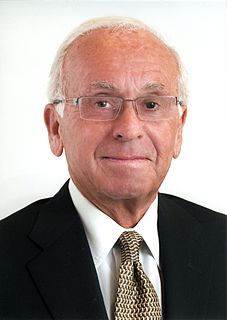
The American Medical Association (AMA) is a professional association and lobbying group of physicians and medical students. Founded in 1847, it is headquartered in Chicago, Illinois. Membership was approximately 240,000 in 2016.

Harvey Vernon Fineberg is an American physician. A noted researcher in the fields of health policy and medical decision making, his past research has focused on the process of policy development and implementation, assessment of medical technology, evaluation and use of vaccines, and dissemination of medical innovations. Fineberg has held several prominent positions over the course of his career, including Dean of the Harvard School of Public Health, Provost of Harvard University, and President of the Institute of Medicine.

Emily Dunning Barringer was the world's first female ambulance surgeon and the first woman to secure a surgical residency.
John Edward Hill is an American family physician in Tupelo, Mississippi.

R Adams Cowley was an American surgeon considered a pioneer in emergency medicine and the treatment of shock trauma. Called the "Father of Trauma Medicine", he was the founder of the United States' first trauma center at the University of Maryland in 1958, after the US Army awarded him $100,000 to study shock in people—the first award of its kind in the United States. The trauma unit at first consisted of two beds, and was later expanded to four beds. Many people called the four-bed unit the "death lab." Cowley was the creator of the "Golden Hour" concept, the period of 60 minutes or less following injury when immediate definitive care is crucial to a trauma patient's survival. He was a leader in the use of helicopters for medical evacuations of civilians, beginning in 1969, and founded the Society of Thoracic Surgeons. He also founded the nation's first statewide EMS system, called MIEMSS by Executive Order of Maryland's Governor Mandel, 1972, as well as the National Study Center for Trauma and EMS, enacted by Congress in 1986 and signed into law by President Ronald Reagan. He is also known for being one of the first surgeons to perform open-heart surgery and invented both a surgical clamp that bears his name and the prototype pacemaker that was used by Dwight D. Eisenhower.

Cato T. Laurencin, M.D., Ph.D., is an American engineer, physician, scientist, innovator and a University Professor of the University of Connecticut.
Mark R. Geier is an American former physician and controversial professional witness who testified in more than 90 cases regarding allegations of injury or illness caused by vaccines. Since 2011, Geier's medical license has been suspended or revoked in every state in which he was licensed over concerns about his autism treatments and his misrepresentation of his credentials to the Maryland Board of Health, where he falsely claimed to be a board-certified geneticist and epidemiologist.
The American Orthopaedic Society for Sports Medicine (AOSSM) promotes sports medicine education, research, communication, and fellowship and includes national and international orthopaedic sports medicine leaders. The Society works closely with many other sports medicine specialists, including athletic trainers, physical therapists, family physicians, and others to improve the identification, prevention, treatment, and rehabilitation of sports injuries. Formed in 1972 as a forum for education and research with 100 members, the AOSSM today has to more than 2,000 members.
John A. Hefferon, is an American co-medical director and chairman of the orthopedic surgery department at the Neurologic & Orthopedic Hospital of Chicago (NOHC), founded in 2003 and formerly known as the Neurologic & Orthopedic Institute of Chicago. He is affiliated with Northwestern Memorial Hospital and Saint Joseph Hospital. Hefferon also is an assistant professor in the Department of Orthopaedic Surgery at Northwestern University Medical School in Chicago.
The American Association of Professional Ringside Physicians (AAPRP) is an organization of physicians that work in the boxing and mixed martial arts (MMA) industries. The organization includes physicians from around the globe.
The Independent Payment Advisory Board, or IPAB, was to be a fifteen-member United States Government agency created in 2010 by sections 3403 and 10320 of the Patient Protection and Affordable Care Act which was to have the explicit task of achieving specified savings in Medicare without affecting coverage or quality. Under previous and current law, changes to Medicare payment rates and program rules are recommended by MedPAC but require an act of Congress to take effect. The system creating IPAB granted IPAB the authority to make changes to the Medicare program with the Congress being given the power to overrule the agency's decisions through supermajority vote. The Bipartisan Budget Act of 2018 repealed IPAB before it could take effect.

Atlantic Health System is one of the largest non-profit health care networks in New Jersey. It employs 18,000 people and more than 4,800 affiliated physicians. The system offers more than 400 sites of care, including six hospitals: Chilton Medical Center, Goryeb Children’s Hospital, Hackettstown Medical Center, Morristown Medical Center, Newton Medical Center and Overlook Medical Center.

The history of veterinary medicine in the Philippines discusses the history of veterinary medicine as a profession in the Philippines. Its history in the Philippines began in 1828, while the Philippines was still a colony of Spain, progressing further during the time when the Philippines became a territory of the United States, until the establishment of the Philippines as an independent Republic in the modern-day era.

Ronald J. Ross is a Cleveland, Ohio radiologist known for research on brain injury in professional and amateur boxers and for the first clinical use of nuclear magnetic resonance imaging on human patients. Ross is also credited with the first use of head and whole body computed tomography imaging (CT) in a private clinical setting in the United States.
Antonio Alamo Jr., better known as Tony Alamo, is an American physician who served as the chairman of the Nevada Gaming Commission from 2014 to 2020. He has served as the chairman of the Nevada State Athletic Commission's Medical Advisory Board and as the Chief of Staff at Sunrise Hospital and Children's Medical Center and St. Rose San Martin Hospital.
Barbara Ross-Lee, D.O. is an American physician, academic, and the first African-American woman to serve as dean of a U.S. medical school. She majored in biology and chemistry at Wayne State University, graduating in 1965. Then, in 1969, she entered Michigan State University's College of Osteopathic Medicine. Ross-Lee then went on to open her own private family practice, teach as a professor, and hold other positions within the medical community, until 1993 when she was elected as the first woman dean of a medical school, at Ohio University's Heritage College of Osteopathic Medicine. She has earned several awards and honors for her work and accomplishments.
Barry Jordan is an American neurologist. He currently serves as the assistant medical director at Burke Rehabilitation Hospital in White Plains, N.Y. He is also the director of neurorehabilitation and director of the Memory Evaluation Treatment Service at Burke. Jordan is a board certified neurologist specializing in sports neurology, Alzheimer's disease, and traumatic brain injury. Jordan has been at Burke Rehabilitation Hospital since 1999.

Faisal Sultan is a Pakistani infectious diseases physician who has served as the Chief Executive Officer of the Shaukat Khanum Memorial Cancer Hospital and Research Centre from 2003 to 2020. He was later appointed as the Special Assistant to the Prime Minister on National Health Services in August 2020.
Dr Paddy Golden is a Belfast-born acute care physician, who has worked in emergency departments throughout Western Australia. He is also a sports doctor, primarily speciliazing in head trauma, weight cutting in rugby and combat sports.
Ligia Peralta is a Dominican-born doctor of pediatrics and adolescent medicine in Maryland. Her research focuses on HIV and the transmission of HIV in adolescents, specifically those from under-served communities.








